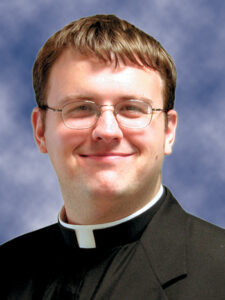 Dear Parishioners,
Dear Parishioners,
As we approach the end of this month, we come to an important anniversary in our Church: 500 years ago on October 31st, Martin Luther posted his 95 theses to a church door in Wittenberg and began the Protestant Reformation. Martin Luther was greatly concerned about corruptions within the Church. During this time, there were many abuses including the sale of indulgences and corruption of the clergy. He also thought certain doctrines of the Church and Papal authority were veering from the truth of the Gospel. Instead of listening to popes and councils, he argued that one should only listen to one’s conscience and that scripture alone was the sole source of religious knowledge.
As a convert from Lutheranism, I have mixed feeling about the movement Luther started. On one hand, I can appreciate much of what Luther was trying to accomplish. Keeping Christ as the focus of one’s faith is a good thing and we should always draw ourselves back to Him because He is our center and the reason for everything else. Also, many of Luther’s criticisms of the Church’s abuses were correct and definitely needed to be addressed.
On the other hand, I do think Martin Luther was wrong in many of his convictions. He was keen to point out a problem, but his solutions ended up being problematic on their own. The appeal to scripture alone is selfcontradictory because there was a time when the Church existed without scripture in apostolic times. If scripture is the only central authority, how did the early Christians survive without it? Also, a text cannot be an authority because writings are not self-interpreting. The appeal to faith alone is also problematic especially in light of James 2:24 which reads, “See how a person is justified by works and not by faith alone.” (I could write a whole article about either of these core Protestant beliefs. But I do not have enough space here.) In each of these “alone” doctrines, there’s a real attempt to preserve a purity of faith. But, they are ultimately untrue. As G. K. Chesterton said, “The old man is always wrong; and the young people are always wrong about what is wrong with him.”
We cannot underestimate the impact of the Protestant Reformation on history. The Reformation period led to a great dividing on Europe along religious lines. Many wars were fought, and Christians persecuted Christians for striving to be Christians. Even today, many Protestants fundamentally misunderstand what the Catholic Church teaches by saying that we worship Mary, or that we believe that we are saved by our good works. Luther’s call to a return to the authentic Gospel somehow turned into thousands of different denominations teaching their own version of Christ. By eliminating the influence of the Pope, every man essentially became his own sole authority.
Though it seems impossible from this point of history, we should pray for the unity of all Christians. Christ desires us to be united to each other as He is united to His Father (see John 17). If God wills something, we know it must be possible and we should will it to. The root cause of all division in the world is human sin. This is especially true in the Reformation which was in response to sin in the Church. So, the only way out of this mess is for everyone to strive to be a saint. Our saints are the greatest witnesses of God’s love and the truths of the faith. As all Christians draw closer to Christ, we will find that we are drawing closer to each other as well.
Peace,
Fr. Carter



